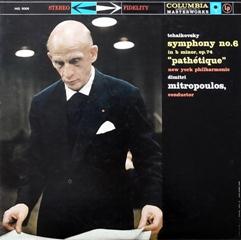Tchaikovsky - Symphony No.6, Op.74 "Pathetique" (Mitropoulos) [1957]
Tchaikovsky - Symphony No.6, Op.74 "Pathetique" (Mitropoulos) [1957]

1 Adagio - Allegro non troppo 2 Allegro con grazia 3 Allegro molto vivace 4 Finale, Adagio lamentoso New York Philharmonic Dimitri Mitropoulos – conductor
Tchaikovsky composed this music between February and August 1893, and conducted the first performance on October 28 of that year in St. Petersburg. Already in 1890 Tchaikovsky had written to his patroness of 13 years, Nadezhda von Meck, about a possible "program symphony." By 1893 he was ready to follow through on the idea, dedicated to his nephew Vladimir Davidov, the "Bobyk" (or "Bob") of many diary-entries and letters during the 1880s. After a successful premiere, however, he was not satisfied with Program Symphony (No. 6) on the title page. Several days later Modest suggested "patetichesky," which in Russian means "1, enthusiastic, passionate; 2, emotional; and 3, bombastic" (rather than "pathetic" or "arousing pity," as in English). Pyotr Il'yich was delighted by the suggestion: "Excellent, Modya, bravo, patetichesky!" He wrote this onto the score, and sent it the same day to his publisher, Jurgenson. Two days later, however, he had qualms and asked Jurgenson to suppress subtitles -- to issue the work simply as Symphony No. 6, dedicated to Bobyk. One week later, he was dead. As for Jurgenson, he could not resist the opportunity in 1893 to publish No. 6, in elegant Lingua Franca, as Symphonie pathétique. The sobriquet has stuck ever since.
During the work's incubation Tchaikovsky was in rare good spirits, pleased with his boldness and fluency, especially in the trailblazing finale, a drawn-out Adagio of funereal character. Where others still wrote conventional slow movements, he hit on the idea of "a limping waltz" in 5/4 time. And he made the scherzo a march that builds to such a pitch of excitement that audiences ever since, everywhere, applaud at the end.
A lugubrious Adagio prologue begins with a bassoon solo in E minor that makes its way upward through the murk of divisi string basses, followed by a nervous little motif that blossoms into the main theme of an Allegro ma non troppo sonata-structure in B minor. The memorably sighing, mauve-hued melody that dominates this movement is actually its secondary subject. A crashing orchestral tutti sets up the passionately agitated development section, followed by a condensed reprise and a brief, calmed coda.
Tchaikovsky's marking for this D major "waltz" movement is Allegro con grazia -- a song and trio with extended coda whose mood may be wistful, even melancholic midway, but whose spirit is balletic, to the extent of echoing Nutcracker's "Waltz of the Flowers," composed a year earlier.
The March-Scherzo, Allegro molto vivace in common time, has an elfin character at the start. It is a sonatina (exposition and reprise without development) that quick-steps to an explosive climax but always returns to tonic G major.
Another sonatina (symphonic developments were Tchaikovsky's bête noire) is anchored in B minor, although the tragic second theme enters in D major. The overall mood is inconsolably grieving, but not "pathetic." Ultimately, the music returns to those murky depths in which the symphony was born some 40 minutes earlier -- without, however, benediction or hope. --- Roger Dettmer, Rovi
Mitropoulos was Music Director of the New York Philharmonic from 1951 until 1958, when he was succeeded (some say "shamefully pushed out") by Leonard Bernstein. This is truly a memorable performance, with sonics that remain spectacular.
download (mp3 @320 kbs):
oboom yandex 4shared mega mediafire cloudmailru uplea








